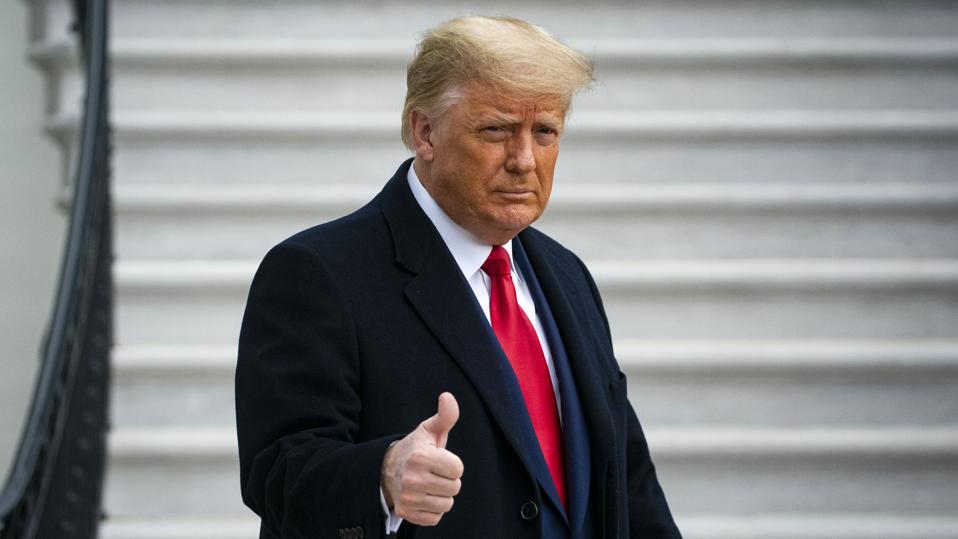Finally: Trump Signs $900 Billion Relief Bill Clearing Way For $600 Stimulus Checks And Averting Shutdown
KEY FACTS
The Senate and the House of Representatives passed the bills last week, but Trump did not immediately sign them because of what he described as “wasteful and unnecessary” provisions in the budget bill and “ridiculously low” direct payments to Americans in the stimulus bill.
Because of Trump’s sudden delay in signing the legislation, two emergency federal unemployment programs expired on Saturday, meaning that millions of Americans will see their benefits lapse until the first week of January when they restart under the new legislation.
The new stimulus bill follows the $2.2 trillion CARES Act from March—the largest economic relief bill in American history—and will re-up a number of key benefits from that legislation, including the popular Paycheck Protection Program of forgivable loans for small businesses and emergency unemployment benefits for self-employed individuals and gig workers.
In addition to $600 direct payments for eligible individuals and families and $300 weekly enhanced unemployment benefits through the middle of March, the new rescue bill includes money for healthcare and vaccine distribution, rental assistance and the entertainment industry.
It will also extend a federal eviction moratorium through the end of January, but it does not include any new federal aid for state and local governments or liability protections for businesses—two major sticking points that held up negotiations for months.
CRUCIAL QUOTE
"I will sign the Omnibus and Covid package with a strong message that makes clear to Congress that wasteful items need to be removed," Trump said in a statement on Sunday, doubling down on his criticism of the federal budget for the 2021 fiscal year and last-minute insistence that the direct payments be upped from $600 to $2,000 per person. "I will send back to Congress a redlined version, item by item, accompanied by the formal rescission request to Congress insisting that those funds be removed from the bill."
WHAT TO WATCH FOR
House Speaker Nancy Pelosi (D-Calif.) said she plans to hold a vote Monday on a stand-alone bill for $2,000 stimulus checks, but that measure is ultimately expected to fail. In his Sunday statement, President Trump acknowledged the House vote for larger direct payments and suggested the Republican-led Senate might cooperate, saying that come Monday, “the Senate will start the process for a vote that increases checks to $2,000, repeals Section 230 and starts an investigation into voter fraud.” In his own statement, however, Senate Majority Leader Mitch McConnell (R-Ky.) praised President Trump for signing the stimulus bill, but gave no indication he would support larger stimulus checks. “The compromise bill is not perfect, but it will do an enormous amount of good for struggling . . . Americans across the country who need help now,” McConnell said.
KEY BACKGROUND
The federal government has now enacted five separate coronavirus relief bills. The first two, which shored up funding for virus testing, small business loans, expanded unemployment benefits and tax credits for paid sick leave, were followed by the CARES Act in March, which created the PPP and authorized $1,200 direct payments to eligible individuals. The CARES Act was followed by a $484 billion package that replenished the PPP (which had exhausted all its funding) just a month later. Trump’s signature on the $900 billion relief bill Sunday marks the end of a months-long stalemate in Washington as lawmakers struggled to come to an agreement on how to deliver more relief to Americans and negotiations between top Democrats led by House Speaker Nancy Pelosi (D-Calif.) and Treasury Secretary Steven Mnuchin went nowhere. Until a bipartisan group of lawmakers introduced a $908 billion framework to jump-start negotiations again this month, Democratic leaders had not been willing to support any package worth less than about $2 trillion and GOP leadership had been reluctant to sign on to anything worth more than about $500 billion.
CHIEF CRITIC
Several lawmakers urged President Trump to sign the relief bill on Sunday. Speaking on ABC’s This Week, Sen. Bernie Sanders (I-Vt.), who, along with Sen. Josh Hawley (R-Mo.), launched a public campaign to up the direct payment provision to $2,000 earlier this month, blasted the president’s delayed signature as “unbelievably cruel” and said he had “not heard a word” from the White House about its support for bigger stimulus checks despite conversations with Mnuchin. “Sign the bill, Mr. President, and then immediately—Monday, Tuesday—we can pass a $2,000 direct payment to the working families of this country," Sanders said.


No comments: